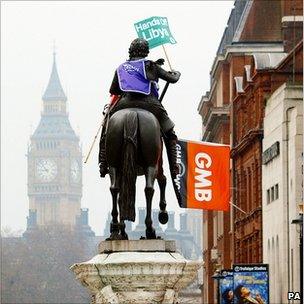TUC condemns post-rally violence in central London
- Published

Signs of the protest are still evident in London
Violence which followed a day of anti-spending cuts protests in London has been condemned by union leaders.
Hours after a peaceful march to Hyde Park, there were clashes between police and protesters in Trafalgar Square.
The TUC said the activities of a few hundred people should not detract from the main message of the official protest, which it said was attended by "between 250,000 and 500,000 people".
Police said a total of 201 arrests had been made during the day.
Business Secretary Vince Cable has said the government will not change its economic strategy as a result of the protest.
He told the BBC's Politics Show: "Certainly we're listening. I talk regularly to the trade union movement, I think it's important we have a dialogue with them but we're not going to change the basic economic strategy.
"No government - coalition, Labour or other - would change its fundamental economic policy simply in response to a demonstration of that kind."
Clock attack
Saturday's arrests were largely for a variety of public order offences, they said. In addition, 66 people were reported to have been injured, including at least 31 police officers, 11 of whom required hospital treatment. The injuries were described as relatively minor.
Police - who have agreed with the TUC's estimation of numbers on the main march - would be studying photographs and CCTV footage and may make more arrests, said the BBC's Daniel Boettcher.
Commander Bob Broadhurst, who was in charge of the Metropolitan Police operation, said his officers had to deal with "mindless yobs" in and around Trafalgar Square in central London.
"We've had a number of - I hesitate to call them protesters - a bunch of people that ended up in Trafalgar Square," he said.
"All was peaceful for quite a long while but then for some reason one of them made an attack on the Olympic [countdown] clock, we moved in to make an arrest, the next minute they're attacking us and they're trying to attack and damage the Olympic clock in Trafalgar Square."
Commander Broadhurst said a group of about 100-150 people had run off, ripping open litter bins and throwing bottles and bricks at police.
He added: "This is just mindless vandalism, hooliganism, it's nothing to do with protest."
The trouble began after demonstrators broke away from the main march and headed towards the shopping district in London's West End.
A group of about 500 people gathered in Oxford Street, before targeting fashion chain Topshop's flagship store and the banks Santander, HSBC and RBS.
The BBC's John McManus was in Trafalgar Square as the clean up operation got under way
Anti-cuts group UK Uncut occupied luxury grocery store Fortnum and Mason in Piccadilly in protest over alleged tax avoidance by the business's owners.
Later in the evening, the protests moved to Trafalgar Square where police kettled demonstrators while they tried to restore order.
One of the people caught up in the trouble in Trafalgar Square, named Sophie, gave an account of events.
'Kicked off'
She said: "All of a sudden about 10-20 Met police came storming down the steps of the National Gallery, ran straight to the Olympic clock.
"I have never seen such a fast escalation of violence in my life. Everything just kicked off, glass everywhere, police hitting people, people being dragged across the floor. I just can't believe it."
After a few hours of containment by police, during which people in the square were allowed to leave only in small groups via its north-eastern corner, there were just a few protesters remaining. BBC Radio 5 live's Dotun Adebayo reported that the square was completely calm after 0200 BST.
Labour leader Ed Miliband, who spoke at the earlier rally, said there was "no excuse" for the violent scenes.
"I unequivocally condemn those who have committed acts of violence," he said.
Policing minister Nick Herbert said "a small minority of individuals were intent on disorder".
- Published27 March 2011
- Published26 March 2011
- Published27 March 2011